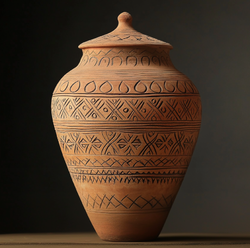Naskel: Difference between revisions
| (3 intermediate revisions by the same user not shown) | |||
| Line 16: | Line 16: | ||
== Core Beliefs == | == Core Beliefs == | ||
* The father god Orundure commanded the god Osumare to create the universe, heavens and world. The other gods populated the world with nature and their sacred influence and gifts. | |||
* The gods are present in all aspects of life; when one speaks the truth, for example, one honours Otitola. The gods bestow blessings on those that honour them. | |||
* The soul returns to the earth and creation after death; they roam the earth and learn and then rise to become the acolyte of the gods, sitting in the hall of a god that most resonates with their personality and studies of the mortal realm after death. These wise ancestors will advocate for their living descendants that honour their memory. | |||
* Morality is absolute and God-given. The law of god is not for man to twist and break. Nevertheless, compassion and joy are principal to honouring the gods, and those who do not honour the gods must be brought back to their grace with love and nurturing. | |||
* The end of days will come when all men and women dream of rainbows and lightning, the world will be flooded with fire, and all of humanity will be cleansed and rise to the halls of the gods according to their reverence; those of least reverence will seat far from their light and grace. | |||
== The Nine Gods == | == The Nine Gods == | ||
=== Orundure - | === Orundure - Celestial Father === | ||
=== Osumare - | === Osumare - Rainbows & Creation === | ||
=== Ifola - | === Ifola - Rain & Life === | ||
=== Dumire - | === Dumire - Unity === | ||
=== Otitola - | === Otitola - Truth === | ||
=== Sabade - | === Sabade - Joy === | ||
=== Isura - | === Isura - Protection & Safety === | ||
=== Eremoni - | === Eremoni - Love === | ||
=== Losade - | === Losade - Future & Fortune === | ||
=== Omonan - | === Omonan - Family & Friendship === | ||
== Seat of Orundure == | == Seat of Orundure == | ||
| Line 53: | Line 59: | ||
== Temples == | == Temples == | ||
== Preachers == | |||
Naskel preachers can be either male or female and are allowed to have a family unless they have chosen a life of contemplation and selfless charity. Preachers typically come from families with a strong preaching tradition but can come from any background. | |||
All preachers are trained in "Gbesolas", renowned schools where student preachers live and study for years before they receive the official seal of rising to the title of preacher. | |||
Once they become preachers, they may seek a temple to preach and live at or open their own temple or garden of worship with the permission of the Gida Gaskiya. | |||
== Gida Gaskiya == | == Gida Gaskiya == | ||
Latest revision as of 04:05, 14 November 2024

| |
|---|---|
| Total Population | |
| Founder | |
| Origin | date: |
| Type | |
| Theology | |
| Scriptures | |
| Branches | |
| Significant regions with adherents | |
| Languages | |
Naskel is a religion.
Core Beliefs
- The father god Orundure commanded the god Osumare to create the universe, heavens and world. The other gods populated the world with nature and their sacred influence and gifts.
- The gods are present in all aspects of life; when one speaks the truth, for example, one honours Otitola. The gods bestow blessings on those that honour them.
- The soul returns to the earth and creation after death; they roam the earth and learn and then rise to become the acolyte of the gods, sitting in the hall of a god that most resonates with their personality and studies of the mortal realm after death. These wise ancestors will advocate for their living descendants that honour their memory.
- Morality is absolute and God-given. The law of god is not for man to twist and break. Nevertheless, compassion and joy are principal to honouring the gods, and those who do not honour the gods must be brought back to their grace with love and nurturing.
- The end of days will come when all men and women dream of rainbows and lightning, the world will be flooded with fire, and all of humanity will be cleansed and rise to the halls of the gods according to their reverence; those of least reverence will seat far from their light and grace.
The Nine Gods
Orundure - Celestial Father
Osumare - Rainbows & Creation
Ifola - Rain & Life
Dumire - Unity
Otitola - Truth
Sabade - Joy
Isura - Protection & Safety
Eremoni - Love
Losade - Future & Fortune
Omonan - Family & Friendship
Seat of Orundure
The seat of Orundure is the main symbol of Naskel and refers to the celestial seat of the father god and patriarch of the gods, a seat from where order flows, and the authority of the god's word originates. A symbol often seen in homes and in buildings when its inhabitants and builders desire to pay respects to their faith and identity.
Jars of Remembrance - The Ibare "Homage in the soil"

The Ibare are essential to the identity and attachment to the land for Naskel peoples. The jars are large ceramic containers of strong-backed ceramic designed to store the remains of the dead; the dead are first ceremoniously allowed to dry under large piles of salt in the morning yards of temples before they are sealed inside intricately decorated jars that commemorate the deceased life.
Wealthy families have crypts in the town homes or mausoleums in their farms to hold the jars of their deceased, places that can be visited to remember them. Once jars become too numerous of the deceased become unfamiliar to the family, they are taken to the Ibare hills, where jars are placed in dry hills amongst thousands of others or in caves.
The Ibare hills are the physical deed of a community to their land, their ancestor's death and remain forever tying them to their lands. These hills are highly respected, and places families visit to celebrate their forgotten and long-lost ancestors; festivals see families visit areas of the hill they believe to hold their ancestors and hold celebrations with music, colourful fabrics and delicious food.
Worship
Temples
Preachers
Naskel preachers can be either male or female and are allowed to have a family unless they have chosen a life of contemplation and selfless charity. Preachers typically come from families with a strong preaching tradition but can come from any background.
All preachers are trained in "Gbesolas", renowned schools where student preachers live and study for years before they receive the official seal of rising to the title of preacher.
Once they become preachers, they may seek a temple to preach and live at or open their own temple or garden of worship with the permission of the Gida Gaskiya.
Gida Gaskiya
Naskel is an organised religion, and its hierarchy is called the Gida Gaskiya, meaning "house of truth", a preacher hierarchy under the authority of the Samuno. A preacher from amongst the hierarchy is uplifted to the position of moral and theological guide. The Samuno resides in the coastal city of Unzaki in Bashira (nation 91).
The Gida Gaskiya is composed of preachers selected by national or regional Naskel preacher associations that are sent to Unzaki to commune with the greater Naskel community. The conclave of the Gida Gaskiya meets regularly to discuss matters of faith and make proclamations that all naskel preachers adhere to across the Naskel world.
The Samuno's authority is what gives preachers their legitimacy, and all legitimate preachers have their title bestowed by the Unzaki conclave and the office of the Samuno.
Jinwara
The Jinwara is the sacred text of Naskel. It was formulated by the Gida Gaskiya with all the songs of worship and poems of doctrine. TheThe text is written in poetic and song form to teach the beliefs and doctrines of the faith and to inspire and guide the lives of the Naskel believers.